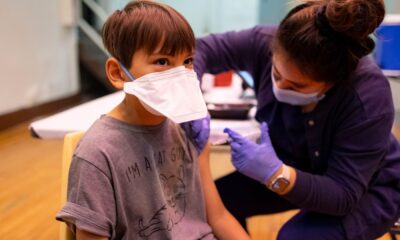Health
Whooping Cough Cases Surge in Monongalia County: Health Alert

Cases of whooping cough have significantly increased in Monongalia County, with health officials reporting a total of five confirmed cases. The rise in infections has prompted local health authorities to emphasize preventive measures and the importance of vaccination to protect families.
Vaccination and Symptoms
According to Dr. Brian Huggins, the medical director and county health officer at the Monongalia County Health Department, vaccination remains the most effective method to combat whooping cough. “Vaccination is really the only way to protect against whooping cough,” Huggins stated. He also noted that avoiding contact with sick individuals can help reduce risk.
The vaccines available include the DTaP and Tdap shots, which protect against whooping cough, tetanus, and diphtheria. However, Huggins warned that these vaccines are not as long-lasting as many others, with effectiveness rates of approximately 65-70% that diminish over time, according to the Centers for Disease Control and Prevention (CDC).
Whooping cough presents a range of symptoms. Early signs can mimic a common cold, featuring mild fever, cough, runny nose, and sinus congestion. As the illness progresses, it can lead to severe coughing fits that may be violent and rapid. In infants, the condition can cause serious breathing difficulties, including apnea, which can be life-threatening. Huggins mentioned that symptoms can persist for up to 10 weeks.
Infectious Period and Treatment
Whooping cough is caused by a bacterial infection, and treatment typically involves antibiotics, which can reduce the duration of symptoms. Huggins advised that individuals experiencing severe symptoms should consult their primary care provider, or consider visiting urgent care or an emergency department. “Treatment typically reduces that infectious period,” he explained.
Notably, symptoms may take several weeks to appear after exposure. Huggins highlighted that the infectious period for whooping cough is longer than for many other illnesses. “You are infectious from the time your symptoms start until at least two weeks after coughing begins,” he noted. “The infection period could potentially last up to four weeks.”
Vaccination against whooping cough begins in infancy. The DTaP vaccine is administered in a five-dose series at 2, 4, 6, 15, and 18 months of age. The first dose of Tdap is given at ages 11 to 12, with booster shots recommended every ten years thereafter. Huggins urged anyone who believes they may have been in contact with someone diagnosed with whooping cough to seek medical advice and consider obtaining a post-exposure dose of antibiotics.
As health officials continue to monitor the situation, community awareness and adherence to vaccination schedules play crucial roles in preventing further outbreaks of whooping cough in Monongalia County.
-

 Technology4 months ago
Technology4 months agoDiscover the Top 10 Calorie Counting Apps of 2025
-

 Health2 months ago
Health2 months agoBella Hadid Shares Health Update After Treatment for Lyme Disease
-

 Health3 months ago
Health3 months agoErin Bates Shares Recovery Update Following Sepsis Complications
-

 Technology3 weeks ago
Technology3 weeks agoDiscover 2025’s Top GPUs for Exceptional 4K Gaming Performance
-

 Technology2 months ago
Technology2 months agoElectric Moto Influencer Surronster Arrested in Tijuana
-

 Technology4 months ago
Technology4 months agoDiscover How to Reverse Image Search Using ChatGPT Effortlessly
-

 Technology4 months ago
Technology4 months agoMeta Initiates $60B AI Data Center Expansion, Starting in Ohio
-

 Technology4 months ago
Technology4 months agoRecovering a Suspended TikTok Account: A Step-by-Step Guide
-

 Health4 months ago
Health4 months agoTested: Rab Firewall Mountain Jacket Survives Harsh Conditions
-

 Lifestyle4 months ago
Lifestyle4 months agoBelton Family Reunites After Daughter Survives Hill Country Floods
-

 Technology3 months ago
Technology3 months agoUncovering the Top Five Most Challenging Motorcycles to Ride
-

 Technology4 weeks ago
Technology4 weeks agoDiscover the Best Wireless Earbuds for Every Lifestyle















